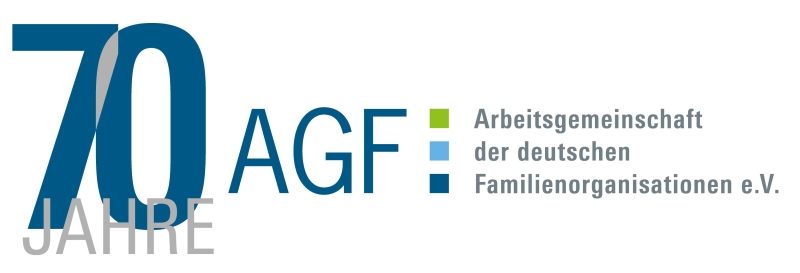
The Association of German Family Organisations (AGF), together with the “Platform for Nutrition and Physical Activity (peb), hosted a digital expert discussion on the European “Child Guarantee”. What is the state of child nutrition in Germany? What is the content of the part of the European Child Guarantee that relates to nutrition and what must Germany do to implement the Guarantee nationally? What experience and recommendations should German policy-makers take into account in the national action plan envisaged under the Child Guarantee? These questions were addressed by selected experts at an online event on 31 May 2021.
Background: #EUChildGuarantee – The “European Guarantee for Children”
The European Child Guarantee is the EU’s response to the high number of children in poverty who are affected by social exclusion and lack of opportunities to participate in society. After a long development process, the European Commission published a concrete proposal on this, which served as the basis for the expert discussion. The initiative aims to give children in need the right to access the basic resources they need for their well-being and development. The target group-oriented Child Guarantee is embedded in the universal European Children’s Rights Strategy, which was published on 24 March.
The European Commission classifies children in precarious family situations as a vulnerable group. However, the Child Guarantee also acknowledges other forms of child disadvantage that can impede social inclusion and participation. These include homelessness, disability, migrant background, ethnic discrimination and institutionalisation.
Access rights for children in need relate to the following areas:
• free medical care,
• free education,
• free childcare facilities,
• adequate housing conditions and
• appropriate diet.
Following the expert meeting, the final version of the Child Guarantee was adopted by the European Council on 14 June. It calls on member states to submit a national action plan within nine months for the implementation of the Child Guarantee for the period until 2030.
One healthy free meal per day for every child
In Germany, the AGF is accompanying the process of implementing the Child Guarantee with expert discussions on the above-mentioned key points of the Child Guarantee. AGF Managing Director Sven Iversen presented the background to the Child Guarantee, as well as the specific objective of the topic of nutrition, namely “to ensure that children in need have effective access to sufficient and healthy food”. He explained that, in the European Commission’s draft, the member states are encouraged to:
“(a) support access to healthy meals also outside of school days, including through in-kind or financial support;
(b) ensure that nutrition standards in early childhood education and care and education establishments address specific dietary needs;
(c) limit advertisement and restrict the availability of foods high in fat, salt and sugar in early childhood education and care and education establishments;
(d) provide adequate information to children and families on healthy nutrition for children.”
“Healthy lifestyles are not a matter of ‘free choice'”
At the beginning of the nutrition-specific part of the expert discussion, Julika Loss, who has been Head of the Health Behaviour Department at the Robert Koch Institute in Berlin since mid-2020 and was previously Professor of Medical Sociology at the University of Regensburg, threw light on the situation with respect to child nutrition in Germany. Results of the “EsKiMo 2 Study” showed that children from families with low socio-economic status in particular consumed sweetened beverages disproportionately often and conversely had a high need for fresh fruit and vegetables. In addition, they tended not to take up school meals offered at lunchtime. “Healthy lifestyles are not a matter of ‘free choice’ but rather the result of possibilities and options available to a person,” Loss concluded. She continued: “The Child Guarantee initiative is therefore extremely welcome, as it aims to reduce the impact of social inequality on children’s diets.”
“It takes political will”
Stephan Wahlen tackled the question of how social differences “translate” into differences in behaviour in child nutrition and how “nutritional justice” could be shaped in the face of social inequality. The Professor of Nutrition Sociology at the Justus Liebig University in Gießen stressed that access to healthy nutrition should include not only economic support but also cultural aspects in order to enable participation. Anke Oepping, head of the National Quality Centre for Nutrition in Daycare and School (NQZ), agreed: “There is no collective ‘we’ in Germany when it comes to providing for children’s nutrition. This requires professionals on the ground. If young people in Germany’s daycare centres and schools are to grow up with a healthy and sustainable diet, this is not subject to the laws of the free market economy but must and can be controlled. We have a lot of knowledge in Germany, but we also need the political will and implementation on the ground.”
Investing in prevention: “A child is what its mother eats”
One focus of the expert discussion was on the long-term significance in terms of children’s nutrition of the “first 1,000 days” in their lives (perinatal phase). The paediatrician Regina Ensenauer (“A child eats what its mother eats”) from the Max Rubner Institute explained that maternal weight in pregnancy, as well as the duration of breastfeeding, have long-term effects on the child’s weight as it develops – children of obese mothers are more likely to be overweight. Aleyd von Gartzen from the German Midwives Association also emphasised the potential of the first 1,000 days in a child’s life. Breastfeeding is prevention – for the mothers as well. The WHO aims to increase the rate of exclusively breastfed children in the first six months of life to 50 per cent by 2025. Parents should be introduced to more conscious healthy eating habits already at the beginning of their parenthood. Midwives have a special role to play here, since they are able to positively influence the eating habits, because of the long time they time they take provide support for the families. Mechthild Paul (National Centre for Early Intervention) pleaded for more “family orientation”, participation and appreciation. Parents should be better involved and new ways of communication should be used. In addition, health-promoting settings should be created for families and their children. She also advocated investigating the consequences of the coronavirus crisis for child nutrition. It is now time to invest in prevention in order to achieve long-term improvements, Paul stressed. Katharina Krüger (Gesund ins Leben network at the Federal Institute for Agriculture and Food) stressed the importance of agreeing on uniform and unambiguous messages, for example on nutrition and exercise during pregnancy, infancy and early childhood. An efficient way is to qualify multipliers and practitioners who are in contact with young and expectant parents in this phase. This will help avoid uncertainty among families caused by different messages.
Daycare and school catering destined for a paradigm shift
What is the situation regarding balanced nutrition in daycare centres and schools?
Ulrike Arens-Azevedo, Professor of Oecotrophology at the Hamburg University of Applied Sciences (HAW Hamburg), outlined the initial situation in Germany. According to the EsKiMo II study (2020), 87 per cent of children and adolescents could receive a hot meal at school, but only 43 per cent would actually take advantage of it. Within the framework of the programme “Bildung und Teilhabe” (Education and Participation), lunches at school or daycare centres are free of charge for recipients of social benefits, but the take-up rate is low because of various barriers, such as excessive numbers of applications. Arens-Azevedo explained that daycare and school catering in particular are a driving force for change towards a more sustainable world. School meals provide up to 40 per cent of children’s daily energy, and important health promotion and maintenance goals can be achieved in daycare and school catering settings. Last but not least, catering for children can have a long-term positive influence on their eating habits.
Further brief statements were made by Waltraud Weegemann from the German Daycare Association, Katja Flämig from the German Youth Institute (DJI), Sabine Schulze-Greve from the Vernetzungsstelle Kita- und Schulverpflegung Berlin e.V. (Network for Daycare and School Catering Berlin) and Anke Oepping, head of the National Quality Centre for Nutrition in Daycare Centres and Schools (NQZ).
Katja Flämig (DJI) emphasised that the implementation of nutrition standards in child daycare centres is not yet very advanced; indeed, surveys of managers, representatives of responsible bodies and teaching staff show that there is hardly any awareness of nutrition standards. Training of teaching staff too often fails to include training in implementing such standards or in making the standards more flexible. In addition, daycare centres need binding guidelines for dealing with the discrepancies between nutrition in the daycare centre and nutrition in the family environment.
Waltraud Weegemann (German Daycare Association) pointed out that daycare catering is growing in importance, owing to the increasing amount of time that children spend in care and the fact that children introduce the topic of nutrition from the daycare centre into the family. Because of the great importance of the subject, the providers would actively raise it more often, but not all of them were in a position to do so in terms of organisation and budget. She suggested, among other things, that every daycare centre should have a trained nutritionist.
“Kitas and schools are destined for a paradigm shift,” said Anke Oepping (NQZ). This is where experience orientated education takes place, not just cognitive teaching. “We have to trust children more to help shape their own nutrition. My plea is to integrate scientific knowledge, cultural aspects and the engagement of children and young people themselves.” Ms Oepping also called for nationwide monitoring from a public health perspective. In Germany, many different departments are involved in nutrition issues in daycare centres and schools. Sabine Schulz-Greve from the Vernetzungsstelle Kita- und Schulverpflegung Berlin e.V. also called for binding standards and food cultural diversity. For example, the widely accepted standards set by the German nutrition association (DGE) apply not only to traditional German cuisine, but also potentially to a culture-specific diet, which can be implemented in accordance with them. She also advocated a change from price competition to quality competition. She said that providing the school meals at primary level in Berlin (years 1–6), which are free of parental monetary contribution, are attractive. Experiences of discrimination among children and parents would be avoided, bureaucracy would be reduced and the number of people at the table would be increased. Qualitative and quantitative specifications for sustainably produced food in the awarding of daycare and school catering contracts would promote (regional) value chains.
Conclusion
Overall, the participants agreed that the sub-goal of the Child Guarantee, namely to reduce nutritional disadvantage among poor children, children at risk of poverty and children otherwise at risk of social exclusion, is an important task. The close link between socio-economic inequality, the unequal distribution of access to a balanced diet in the population and unequal health opportunities must be broken.
The opportunity to shape the behaviour of children and their families with regard to nutrition in the long term was emphasised. In this context, the first 1,000 days play a special role, among other things because parents are then particularly amenable to receiving tips and support and at the same time important decisions are made about how to ensure good nutrition for the family in the future.
With regard to institutional care, many children would benefit health-wise and socially in terms of equal opportunities by non-contributory daycare and school meals. There was a plea for the gradual introduction of such provision, based on a scientific implementation and evaluation programme. It is precisely daycare and school catering that has the potential to bring about a change towards healthier eating habits for all children and their families.
As regards implementation, it was suggested, among other things, to promote comprehensive nutrition education for children and parents, so that people could take responsibility for their own decisions on a balanced diet. Parents should be involved in the planning of the food “culture” in the facilities. Nutrition must also be understood as an educational topic in daycare centres and schools and the competence of professionals in daycare centres and schools in the areas of nutrition and health must be promoted. To this end, education on the subject should be given more time and space in the training of nursery school teachers. In addition, the consistent implementation of quality standards for nutrition in daycare centres and schools is important.

